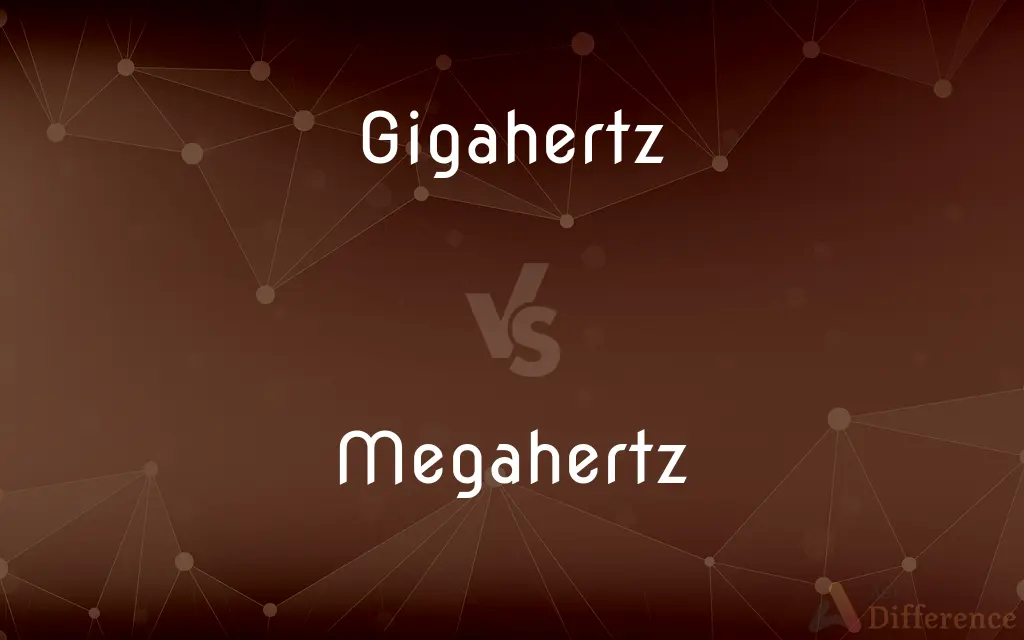Gigahertz vs. Megahertz — What's the Difference?
By Tayyaba Rehman & Fiza Rafique — Updated on April 1, 2024
Gigahertz (GHz) represents billions of cycles per second, used for higher-speed processors, while Megahertz (MHz) denotes millions of cycles, suited for lower-speed devices.

Difference Between Gigahertz and Megahertz
Table of Contents
ADVERTISEMENT
Key Differences
Gigahertz (GHz) is a unit of frequency equivalent to one billion hertz or cycles per second, commonly used to measure the clock speed of computer processors, indicating their performance and processing speed. On the other hand, Megahertz (MHz) is a unit of frequency equal to one million hertz or cycles per second, often used to measure the transmission speed of electronic devices, including some older or less powerful computer processors. This difference highlights the scale of operation, with GHz indicating more advanced, high-speed operations.
In terms of technology and electronics, devices operating at gigahertz frequencies are typically faster and more capable of multitasking than those operating in megahertz. Whereas, devices measured in MHz might be older, less expensive, or designed for simpler tasks, reflecting a distinction in their applications and capabilities.
The transition from MHz to GHz in computing and electronic devices marks significant technological advancement, showcasing improved processing capabilities and efficiency. On the other hand, the use of MHz in certain applications, such as radio frequency identification (RFID) and some communication devices, emphasizes the adequacy of lower frequencies for specific purposes.
GHz frequencies are crucial for high-performance computing tasks such as gaming, graphic design, and video editing, requiring rapid data processing. Conversely, MHz frequencies are still relevant in applications like basic computing tasks and certain wireless communications, where extreme speed is not a necessity.
In comparing GHz to MHz, it's evident that GHz offers a higher threshold of performance suited for the demands of modern computing and digital technologies. On the contrary, MHz remains useful for a range of applications where high speed is not critical, illustrating the diverse requirements across different technological domains.
ADVERTISEMENT
Comparison Chart
Definition
Unit of frequency equal to one billion hertz (cycles per second).
Unit of frequency equal to one million hertz (cycles per second).
Usage
Measuring processing speeds of computer processors and high-speed electronic devices.
Measuring transmission speeds of electronic devices and processors in older or simpler technology.
Scale
Indicates higher-speed, advanced technological capabilities.
Represents lower-speed, often used in less demanding applications.
Technological Relevance
Suited for high-performance computing and modern digital applications.
Relevant for simpler tasks and technologies that do not require high processing speeds.
Examples
High-speed computer CPUs, advanced smartphones.
Older computer models, certain communication devices.
Compare with Definitions
Gigahertz
Often compared to MHz to highlight technological advancement.
Upgrading from a processor running at 800 MHz to one at 2 GHz significantly boosts performance.
Megahertz
A unit of frequency equal to 1,000,000 cycles per second.
Older radio systems operate in the range of several hundred megahertz.
Gigahertz
Indicates a device's capability for high-speed operations.
A 5 GHz Wi-Fi router offers faster data transmission than its 2.4 GHz counterpart.
Megahertz
Measures processor speeds in older or simpler technology.
The computer's processor runs at 800 MHz, suitable for basic tasks.
Gigahertz
Used to measure the speed of computer processors.
The latest processor operates at 3.5 GHz, ensuring high-speed computing.
Megahertz
Reflects the operational capacity of electronic devices for certain tasks.
A 900 MHz cordless phone provides adequate range and clarity for home use.
Gigahertz
A key metric for assessing the operational speed of electronic devices.
Smartphones with higher GHz ratings are preferred for gaming and multimedia tasks.
Megahertz
Helps gauge the suitability of a device for specific applications.
A 100 MHz processor may be sufficient for a digital watch or calculator.
Gigahertz
A unit of frequency equal to 1,000,000,000 cycles per second.
Modern computers operate at several gigahertz to manage complex tasks efficiently.
Megahertz
Highlights the speed limitations of older technology.
Devices operating at MHz are generally slower than those running at GHz.
Gigahertz
A unit of frequency equal to one billion (109) hertz. Also called gigacycle.
Megahertz
One million cycles per second. Used especially as a radio-frequency unit. Also called megacycle.
Gigahertz
One billion hertz, 109 Hz.
Megahertz
A unit equal to one million cycles per second.
Gigahertz
1,000,000,000 periods per second
Megahertz
One million periods per second
Common Curiosities
How does GHz compare to MHz?
GHz represents a higher frequency, indicating faster processing and operational capabilities compared to MHz.
Why are GHz frequencies important in computers?
GHz frequencies indicate the processor's speed, affecting the computer's ability to perform tasks efficiently and quickly.
Can MHz still be relevant in today's technology?
Yes, MHz frequencies are suitable for simpler tasks and technologies where high speed is not necessary.
Is a higher GHz always better?
Generally, higher GHz indicates faster processing, but the best choice depends on the user's specific needs and tasks.
How has the shift from MHz to GHz impacted computing?
The shift has led to significantly faster and more efficient computing, enabling more complex and demanding applications.
What is a Megahertz (MHz)?
A unit of frequency equal to one million hertz, often used for measuring speeds in less advanced technology.
Do GHz and MHz measure the same thing?
Yes, both measure frequency, but GHz denotes higher speeds and more advanced processing capabilities.
What types of devices use MHz frequencies?
Older computers, certain radio systems, and devices requiring less processing power often use MHz frequencies.
Are GHz and MHz interchangeable?
While related as measures of frequency, they are not interchangeable due to the significant difference in magnitude.
What technological advancements have been enabled by GHz frequencies?
GHz frequencies have enabled the development of advanced computing, high-speed internet, and sophisticated gaming and multimedia applications.
What is a Gigahertz (GHz)?
A unit of frequency equal to one billion hertz, indicating high-speed operations in electronic devices.
What role does GHz play in mobile devices?
GHz influences the speed and efficiency of smartphones and tablets, affecting their overall performance and multitasking capabilities.
Why might a device still use MHz instead of GHz?
Some devices prioritize energy efficiency or simplicity over speed, making MHz frequencies more appropriate.
How does MHz affect the performance of a device?
Devices with MHz frequencies typically have slower processing speeds, affecting their performance in more demanding tasks.
How do manufacturers decide between GHz and MHz for a device?
Manufacturers consider the device's intended use, performance requirements, and cost, choosing the frequency that best suits its purpose.
Share Your Discovery

Previous Comparison
Cremation vs. Inhumation
Next Comparison
Friable vs. FryableAuthor Spotlight
Written by
Tayyaba RehmanTayyaba Rehman is a distinguished writer, currently serving as a primary contributor to askdifference.com. As a researcher in semantics and etymology, Tayyaba's passion for the complexity of languages and their distinctions has found a perfect home on the platform. Tayyaba delves into the intricacies of language, distinguishing between commonly confused words and phrases, thereby providing clarity for readers worldwide.
Co-written by
Fiza RafiqueFiza Rafique is a skilled content writer at AskDifference.com, where she meticulously refines and enhances written pieces. Drawing from her vast editorial expertise, Fiza ensures clarity, accuracy, and precision in every article. Passionate about language, she continually seeks to elevate the quality of content for readers worldwide.















































